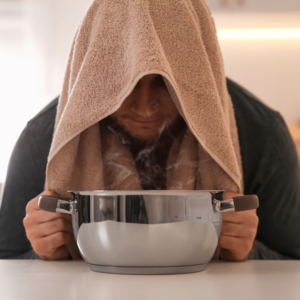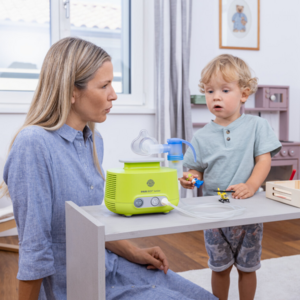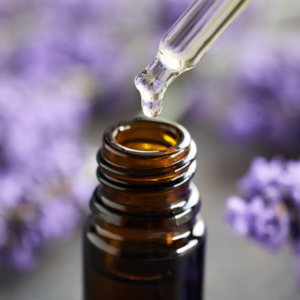Lavender oil, eucalyptus oil, homemade saline solution and other substances are often applauded as effective home remedies for inhalation therapy. According to Prof. Rainald Fischer, they deserve no such praise. In an interview, he discusses effective methods and the risks of inhalation therapy with home remedies.

Prof Dr Fischer: I am not at all impressed by the idea of this home remedy for inhalation therapy for the lungs. First of all, the salt crystals stay in the water. This is because salt has a higher boiling point than water. So the salt stays behind in the bowl, pot or plastic inhaler and you only inhale hot steam, but no salt.
And secondly, the droplets are too large to reach the lungs. They stay behind in the mouth and throat, but do not reach the bronchial tubes and so cannot moisturise them and release the mucus coating them.
I am surprised time and again by how many people come to my consultancy telling me they have tried out salt inhalation with steam. I can only stress that this is ineffective for the lungs, so is no more than a quack method if you are trying to treat the bronchial tubes.

Saline solution only reaches the lower airways if it is inhaled through an electric inhalation device, also known as a nebuliser. If you have to or want to inhale with saline, please use a nebuliser. Everything else is a waste of time.
Added to this, unlike a homemade saline solution, with professionally produced and sterile-filled saline solutions you can be sure that the solution is not contaminated with unwanted substances. That is relevant. At the end of the day, you are breathing the saline solution deep into your bronchial tubes.
So please, firstly use a nebuliser for the inhalation therapy and secondly buy a specially produced saline solution from the pharmacy or a specialist supplier and do not inhale saline solution you have mixed yourself.

Prof Dr Fischer: Let’s put it this way: As a lung specialist, I cannot imagine this could be healthy in any shape or form. I do not want to have an oily substance in my lungs. That all has to come back out of the bronchial tubes.
Some people push the idea of inhalation therapy with essential oils with nebulisers. There are not enough studies on inhalation therapy with essential oils to properly estimate the efficacy and safety of this inhalation method. This is why this home remedy should be used with great caution.
This also applies given the background that the quality of the essential oils available on the market varies greatly. There are no strict rules for essential oils and so the labels on the products can have incomplete information on which substances are actually in the bottle. Sometimes the oils are mixed with cheaper substances, which has a negative impact on the quality.
There are several groups I would definitely advise to avoid inhalation therapy with essential oils or balsams for colds:
In these people, inhalation of essential oils can irritate the bronchial tubes and cause a tight chest with a cough and shortness of breath.
Prof Dr Fischer: Several! And I usually advise them against home remedies. For instance, there is the idea of inhaling frankincense. Generally speaking, smoke will always irritate the lungs, so it is not an adequate remedy for this reason alone.
There are also patients who want to be prescribed cannabis and who want to inhale it in combination with tobacco – because it apparently expands the airways. If I have problems with tight bronchial tubes, I should of course treat this symptom by inhaling medications that expand the airways and not with tobacco that is proven to harm the tissue of the lungs.
According to pneumologists in the Association of Pneumological Clinics, studies also indicate that cannabis could cause patients to develop pulmonary emphysema and an accumulation of secretions in the lungs. Over time, this can lead to recurrent inflammation with structural damage to the airways caused by the development of bronchiectasis.
I sometimes don’t understand why people trust home remedies which are based on myths and word-of-mouth propaganda - more than they trust methods and medications that are clinically tested and safe and that are proven to be effective. Not everything with “homemade” and “natural” on the label is automatically healthy.
Prof Dr Rainald Fischer is a specialist for internal medicine in private practice, with a subspecialty in lung and bronchial medicine, specialty of emergency medicine, sleep medicine and allergy medicine in Munich-Pasing. Before that he worked as an internist and lung specialist, most recently as a senior physician at the Munich university hospital. Prof Dr Rainald Fischer is a founding member and president of the Deutschen Gesellschaft für Berg- und Expeditionsmedizin (German Society for Mountain and Expedition Medicine), and also a member of the Cystic Fibrosis Medical Association.
Note: The information in this blog post is not a treatment recommendation. The needs of patients vary greatly from person to person. The treatment approaches presented should be viewed only as examples. PARI recommends that patients always consult with their physician or physiotherapist first.
An article written by the PARI BLOG editorial team.
© 2025 PARI GmbH Spezialisten für effektive Inhalation